Hi all!
I received this one today and I 'd like to share it with you, since I made some fruitful research about this officer. I actually ordered the SD and was very pleasantly surprised by the fact that more items came with it, without them having been described by the dealer!
The grouping belonged to Major Archibald John Gutch, M.C., of the Worcestershire Regiment and consists of a KD OSD bearing the Leutenant rank, his medal ribbons, a cap badge and some paperwork.
As I said, research was really fruitful and surprisingly easy, which makes this case one of the exceptions, I think. http://www.worcestershireregiment.co...in=inc/welcome was really helpful. That's what I found out:
"Johnnie Gutch was born in Pembroke on the 25th July 1914. He was commissioned into The Worcestershire Regiment in January 1935 and joined the 1st Battalion in Aldershot. He went to Palestine [as a mortar officer] with the Battalion in 1938, but was invalided home after a severe bout of jaundice in 1939."
One of the actions he took part in while in Palestine is mentioned:
"During this period of time the civil authorities and the police had little or no control in the country; the Arab rebels were doing more or less as they wished; the civil police stations at Bethlehem and Hebron had been burnt out by the rebels; government officials had, with a few exceptions, withdrawn to Jerusalem. The Battalion was given the task of “maintaining public order and security in the Bethlehem and Hebron sub-districts “, a task of some magnitude, involving, as it did, an area of some eight hundred square miles.
In order to carry out this task “D” Company moved to Bethlehem on 29th September 1938, where it was later joined by Battalion H.Q., H.Q. and “C” Companies. “B” Company went to Hebron and “A” Company established a detached post at Inab on the Jerusalem-Jaffa road, whence patrols operated to prevent sabotage of the pipeline carrying Jerusalem’s water supply. At Bethlehem the Battalion was billeted in the monasteries adjoining the historic church of the Nativity. After the initial language difficulties, the Battalion established very friendly relations with the monks, especially the Franciscans.
The arrival in Bethlehem was the occasion for some heavy sniping directed at the Franciscan monastery. Lieutenant A. J. Gutch (Mortar Platoon Officer) got into action with one of his 3inch mortars on the roof and, though the strike area was searched the next morning with no result, the Battalion was never sniped there again."
Returning to duty,
"After one and a half years at Norton Barracks he was posted to the 11th Battalion as Adjutant in 1941. When the 11th Battalion merged with the 1st Battalion Cadre in January 1943 and became the new 1st Battalion, he took over command of ‘C’ Company and landed with them in France in June 1944.
In the Battalion attack on Mouen, France on 29th June 1944, ‘C’ Company was the left hand leading Company. After clearing their part of the village of enemy, the Company reached its objective beyond. Johnnie was badly wounded in this attack and was losing a lot of blood. He refused to be evacuated until he was satisfied with his Company position and had made certain that his platoons were sited exactly to his liking. It was only then that he was persuaded to go back for medical treatment."
This is mentioned in the London Gazette, 10th October 1944:
“On 29th June 1944 this Officer was commanding the left and assaulting Company during the attack on Mouen.
Soon after leaving the start line, he was wounded by shrapnel in the back. He refused to stop to have his wounds attended to or dressed and continued to lead his Company during a difficult house clearing and mopping up operation.
Two of his Platoon Commanders were wounded as was his CSM but this did not deter him. He personally supervised the clearing up of this area and the consolidation of his Company. Only when this was successfully completed did he allow himself to receive treatment and later to be evacuated.
By his personal leadership and example to the Assault Company, he contributed materially in the successful operation on MOUEN.”
Colonel Peter Hall, DSO, in the eighth chapter of his book "Tales of a Disorderly Officer" describes the battle in detail, mentioning his Company Commander (Gutch).
"The plan was that the Worcestershires should attack Mouen by daylight - but under cover of an intense artillery smoke screen, mixed with artillery high explosive fire on located forward enemy positions in the hedgerows just west of the village.
From the start line to our first objective we had to move for about 800 yards through a cornfield that afforded little or no cover from enemy small arms fire and machine guns. These enemy positions were situated on a small ridge - dominating our line of advance.
Without the smoke - or without the cover of darkness - our assault troops would have been mown down, incurring horrendous casualties.
One of the many problems of attacking a strongly defended position at night is that
Verey lights can be fired by the defenders which illuminate the attackers. In a whirl of smoke these lights are far less effective. One has only to drive at night - or through dense fog to draw the same conclusions.
The car headlights at night enable the driver to see. The fog, however, causes this
light to bounce back at the driver and visibility is severely restricted.
The original plan of attack was in a diamond formation. The Company to which I
belonged was allocated to spearhead the attack. The Platoon that I commanded was allocated to spearhead the Company.
My Company Commander (the late Major Johnny Gutch MC) and I discussed our
tactics for this attack. We agreed that we should keep as close behind the artillery
barrage as possible - perhaps risking casualties from our own guns. The advantage
could be that we would descend upon the enemy whilst they were still stunned by the weight of artillery shells which had descended upon them.
This tactic paid off handsomely. The only casualty which we had in my platoon was
me! Suddenly there was an almighty crash - about 20 yards to my left. I felt a great smack on my left arm, buttock and shoulder."
"Having been through the enemy front line, I judged it necessary that my platoon should exploit for about another 100 yards beyond our initial objective. This to enable the two reserve platoons of the Company to advance further into Mouen -supported by a solid firm base - us. This plan necessitated my platoon’s occupation of a derelict farmhouse on the reverse slope of the original German position. Occupation of this building would give covering fire for my Company Commander to deploy his two remaining platoons down the reverse slope to secure the total Company’s objective."
"Some moments later.... two things happened. ONE - my Company Commander
arrived on the scene. TWO - the enemy reacted with heavy artillery and mortar fire.
We both dived for cover in a German slit trench. One on top of the other.
What I think happened next was that my Company Commander looked at my left arm and said, “Peter, your left side is a bloody mess. I’ll get you evacuated!”
I think I answered, “Sod you, Johnny!” I then passed out.
I cannot recall what happened after that. Except that I, eventually, found myself in a hospital ‘somewhere in Surrey’. Leaving my comrades to get on with the war without me. They did it magnificently!
Afternote:- John Gutch, shortly after this incident, was badly wounded in the neck.
Nevertheless, he courageously - and skilfully - exploited the initial advantages we had
gained. He was awarded a very well earned Military Cross.
The last info:
"After the war he served in the Sudan before retiring on the 12th February 1949. He and his wife Joan then ran a hill farm on the east side of Dartmoor.
Johnnie died at Exeter Hospital on 18th December 1988, age 74."
I also found some photos from the same source:
Officers of the 11th Battalion Worcestershire Regt. at Haselbech Hall, Northampton (Nov. 1941), front row, 4th from right.
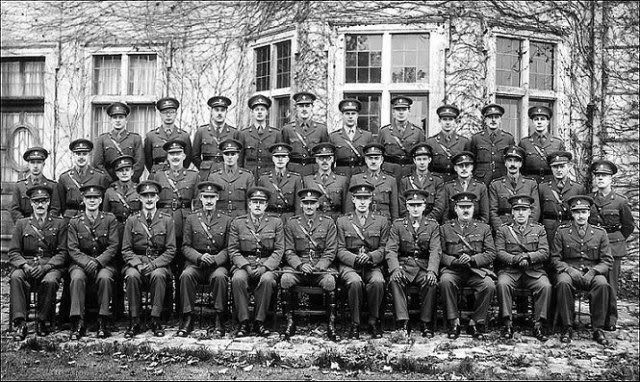
1st Battalion officers, 1943. front row, 4th from right. (photo from Louis Scully collection)
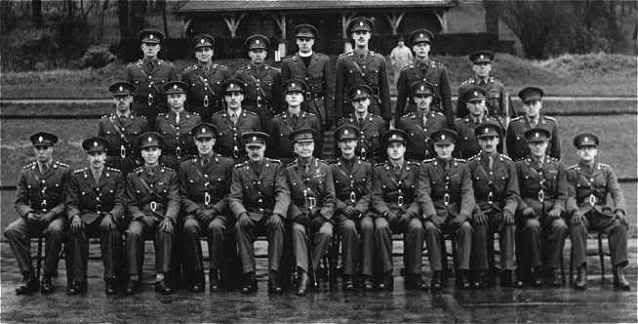
'C' Company - April 1944, 2nd from right.
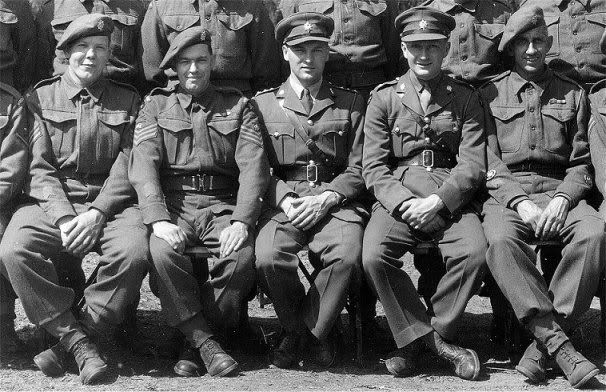
And now, to the grouping:
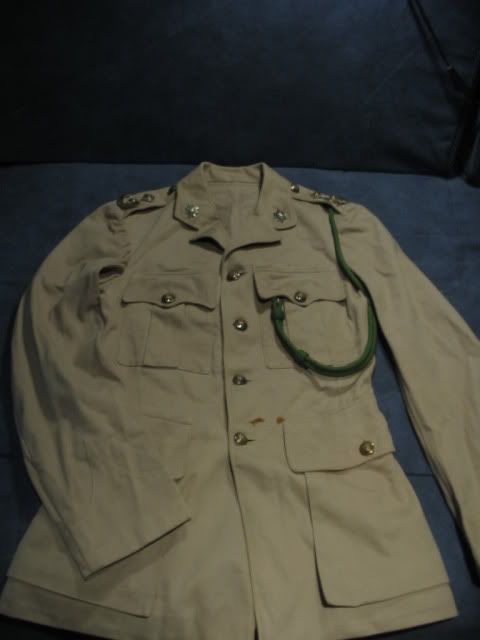
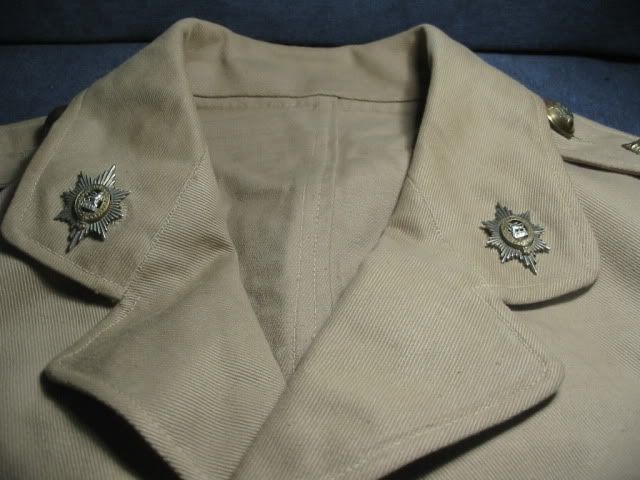
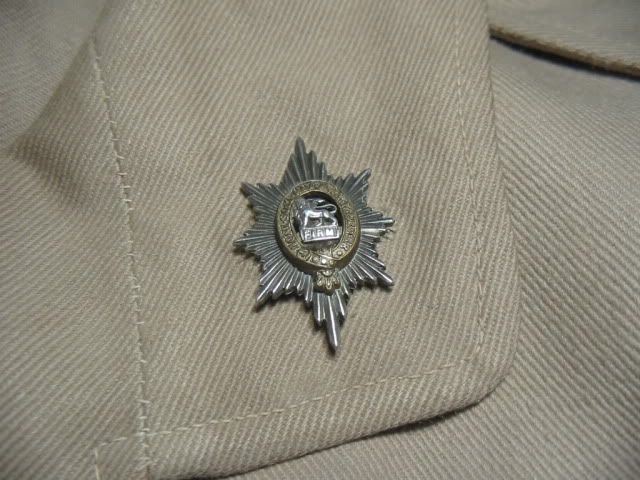
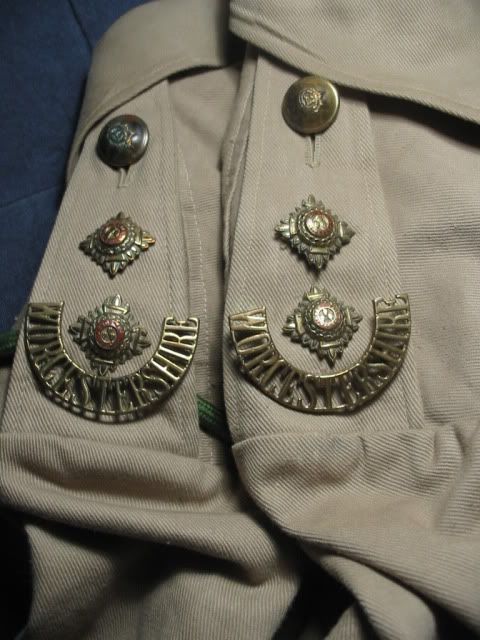
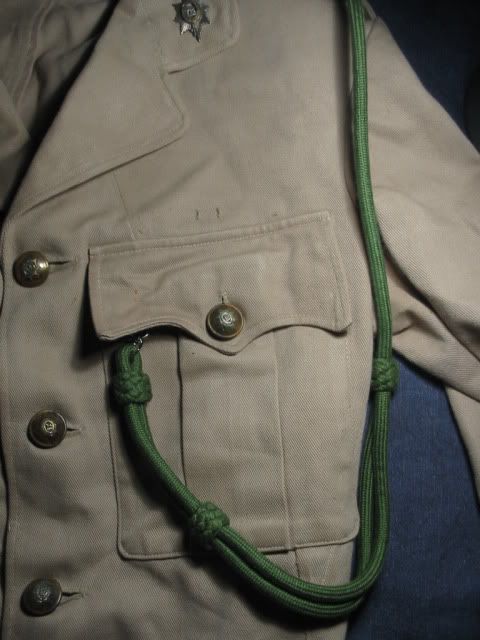
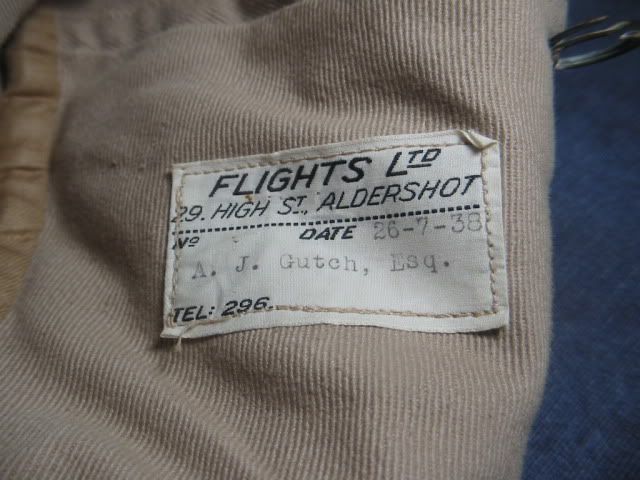
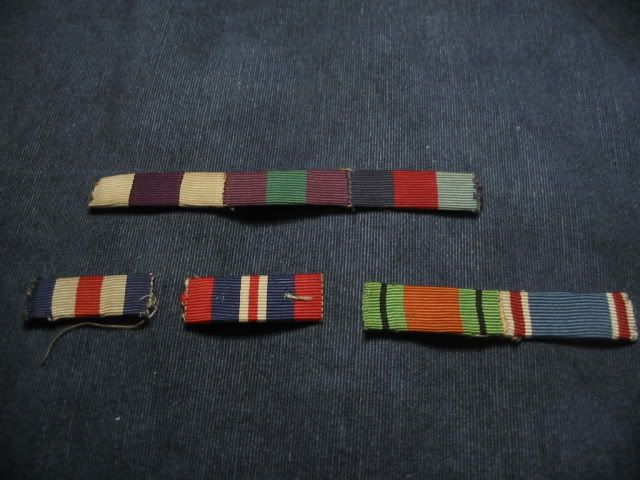
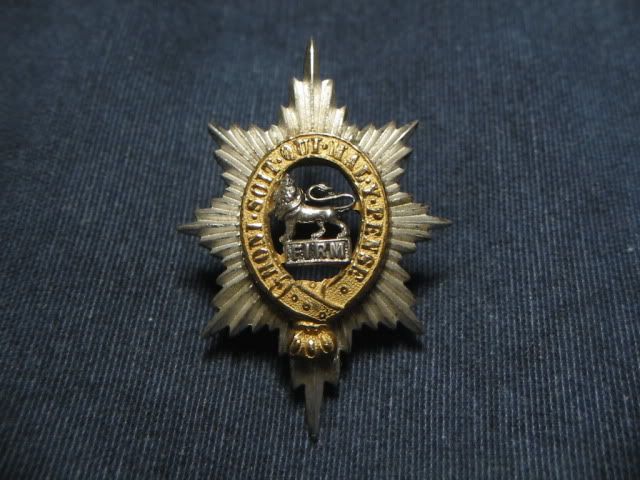
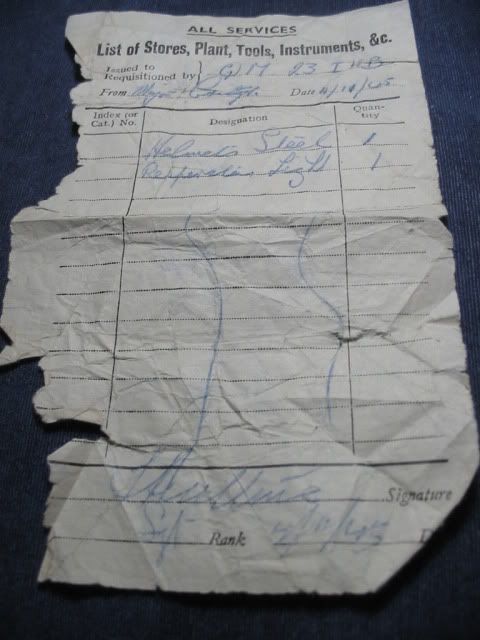
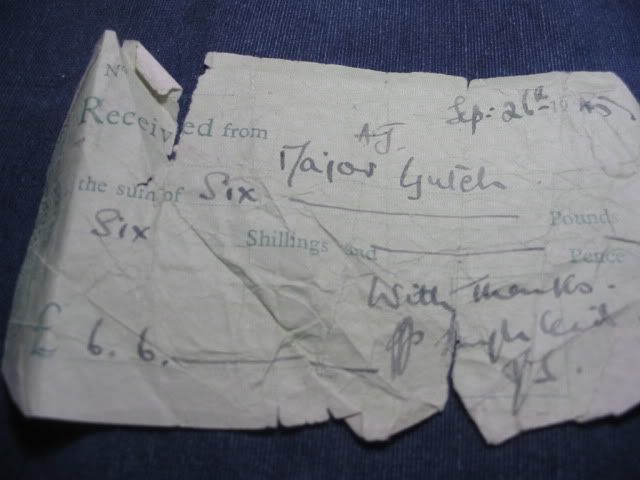
I hope you 'll find it interesting!
Best regards,
Giorgos
I received this one today and I 'd like to share it with you, since I made some fruitful research about this officer. I actually ordered the SD and was very pleasantly surprised by the fact that more items came with it, without them having been described by the dealer!
The grouping belonged to Major Archibald John Gutch, M.C., of the Worcestershire Regiment and consists of a KD OSD bearing the Leutenant rank, his medal ribbons, a cap badge and some paperwork.
As I said, research was really fruitful and surprisingly easy, which makes this case one of the exceptions, I think. http://www.worcestershireregiment.co...in=inc/welcome was really helpful. That's what I found out:
"Johnnie Gutch was born in Pembroke on the 25th July 1914. He was commissioned into The Worcestershire Regiment in January 1935 and joined the 1st Battalion in Aldershot. He went to Palestine [as a mortar officer] with the Battalion in 1938, but was invalided home after a severe bout of jaundice in 1939."
One of the actions he took part in while in Palestine is mentioned:
"During this period of time the civil authorities and the police had little or no control in the country; the Arab rebels were doing more or less as they wished; the civil police stations at Bethlehem and Hebron had been burnt out by the rebels; government officials had, with a few exceptions, withdrawn to Jerusalem. The Battalion was given the task of “maintaining public order and security in the Bethlehem and Hebron sub-districts “, a task of some magnitude, involving, as it did, an area of some eight hundred square miles.
In order to carry out this task “D” Company moved to Bethlehem on 29th September 1938, where it was later joined by Battalion H.Q., H.Q. and “C” Companies. “B” Company went to Hebron and “A” Company established a detached post at Inab on the Jerusalem-Jaffa road, whence patrols operated to prevent sabotage of the pipeline carrying Jerusalem’s water supply. At Bethlehem the Battalion was billeted in the monasteries adjoining the historic church of the Nativity. After the initial language difficulties, the Battalion established very friendly relations with the monks, especially the Franciscans.
The arrival in Bethlehem was the occasion for some heavy sniping directed at the Franciscan monastery. Lieutenant A. J. Gutch (Mortar Platoon Officer) got into action with one of his 3inch mortars on the roof and, though the strike area was searched the next morning with no result, the Battalion was never sniped there again."
Returning to duty,
"After one and a half years at Norton Barracks he was posted to the 11th Battalion as Adjutant in 1941. When the 11th Battalion merged with the 1st Battalion Cadre in January 1943 and became the new 1st Battalion, he took over command of ‘C’ Company and landed with them in France in June 1944.
In the Battalion attack on Mouen, France on 29th June 1944, ‘C’ Company was the left hand leading Company. After clearing their part of the village of enemy, the Company reached its objective beyond. Johnnie was badly wounded in this attack and was losing a lot of blood. He refused to be evacuated until he was satisfied with his Company position and had made certain that his platoons were sited exactly to his liking. It was only then that he was persuaded to go back for medical treatment."
This is mentioned in the London Gazette, 10th October 1944:
“On 29th June 1944 this Officer was commanding the left and assaulting Company during the attack on Mouen.
Soon after leaving the start line, he was wounded by shrapnel in the back. He refused to stop to have his wounds attended to or dressed and continued to lead his Company during a difficult house clearing and mopping up operation.
Two of his Platoon Commanders were wounded as was his CSM but this did not deter him. He personally supervised the clearing up of this area and the consolidation of his Company. Only when this was successfully completed did he allow himself to receive treatment and later to be evacuated.
By his personal leadership and example to the Assault Company, he contributed materially in the successful operation on MOUEN.”
Colonel Peter Hall, DSO, in the eighth chapter of his book "Tales of a Disorderly Officer" describes the battle in detail, mentioning his Company Commander (Gutch).
"The plan was that the Worcestershires should attack Mouen by daylight - but under cover of an intense artillery smoke screen, mixed with artillery high explosive fire on located forward enemy positions in the hedgerows just west of the village.
From the start line to our first objective we had to move for about 800 yards through a cornfield that afforded little or no cover from enemy small arms fire and machine guns. These enemy positions were situated on a small ridge - dominating our line of advance.
Without the smoke - or without the cover of darkness - our assault troops would have been mown down, incurring horrendous casualties.
One of the many problems of attacking a strongly defended position at night is that
Verey lights can be fired by the defenders which illuminate the attackers. In a whirl of smoke these lights are far less effective. One has only to drive at night - or through dense fog to draw the same conclusions.
The car headlights at night enable the driver to see. The fog, however, causes this
light to bounce back at the driver and visibility is severely restricted.
The original plan of attack was in a diamond formation. The Company to which I
belonged was allocated to spearhead the attack. The Platoon that I commanded was allocated to spearhead the Company.
My Company Commander (the late Major Johnny Gutch MC) and I discussed our
tactics for this attack. We agreed that we should keep as close behind the artillery
barrage as possible - perhaps risking casualties from our own guns. The advantage
could be that we would descend upon the enemy whilst they were still stunned by the weight of artillery shells which had descended upon them.
This tactic paid off handsomely. The only casualty which we had in my platoon was
me! Suddenly there was an almighty crash - about 20 yards to my left. I felt a great smack on my left arm, buttock and shoulder."
"Having been through the enemy front line, I judged it necessary that my platoon should exploit for about another 100 yards beyond our initial objective. This to enable the two reserve platoons of the Company to advance further into Mouen -supported by a solid firm base - us. This plan necessitated my platoon’s occupation of a derelict farmhouse on the reverse slope of the original German position. Occupation of this building would give covering fire for my Company Commander to deploy his two remaining platoons down the reverse slope to secure the total Company’s objective."
"Some moments later.... two things happened. ONE - my Company Commander
arrived on the scene. TWO - the enemy reacted with heavy artillery and mortar fire.
We both dived for cover in a German slit trench. One on top of the other.
What I think happened next was that my Company Commander looked at my left arm and said, “Peter, your left side is a bloody mess. I’ll get you evacuated!”
I think I answered, “Sod you, Johnny!” I then passed out.
I cannot recall what happened after that. Except that I, eventually, found myself in a hospital ‘somewhere in Surrey’. Leaving my comrades to get on with the war without me. They did it magnificently!
Afternote:- John Gutch, shortly after this incident, was badly wounded in the neck.
Nevertheless, he courageously - and skilfully - exploited the initial advantages we had
gained. He was awarded a very well earned Military Cross.
The last info:
"After the war he served in the Sudan before retiring on the 12th February 1949. He and his wife Joan then ran a hill farm on the east side of Dartmoor.
Johnnie died at Exeter Hospital on 18th December 1988, age 74."
I also found some photos from the same source:
Officers of the 11th Battalion Worcestershire Regt. at Haselbech Hall, Northampton (Nov. 1941), front row, 4th from right.

1st Battalion officers, 1943. front row, 4th from right. (photo from Louis Scully collection)

'C' Company - April 1944, 2nd from right.

And now, to the grouping:










I hope you 'll find it interesting!
Best regards,
Giorgos

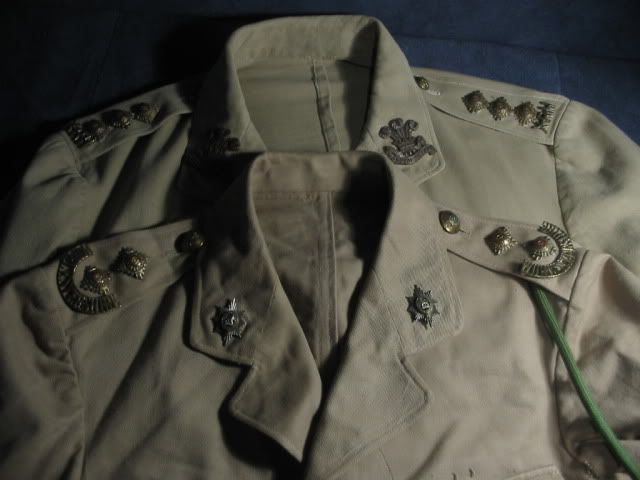

Comment